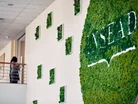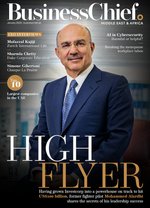
Imagine if you started writing a book about business strategy five years ago how much you would need to redraft for today’s commercial climate – not to mention the effects of climate change and wider ESG issues.
Once you’ve finished those amendments, chances are you would have to create a whole new chapter to accommodate the latest trends.
From artificial intelligence to remote working, today’s CEO has an evolving landscape to navigate.
No wonder, then, that executive education is also evolving at the speed of business. With this constant need to reassess and reinvent the corporate curriculum, executive education is booming. In 2023, that market is valued at US$46 billion globally, but set to rise to US$134 billion in the next decade, according to Future Market Insights.
That is great news for leading business schools like Duke Corporate Education (CE) and INSEAD.
The former was named the global leader in custom executive education according to the 2023 Financial Times Executive Education Rankings, while the latter came second. INSEAD has a Middle East Campus in Abu Dhabi, while Duke CE supports clients in the region from its base in Singapore.
Both have launched programmes aimed specifically at sustainability, identifying this as the biggest single challenge of our times, and also their biggest opportunity to educate the leaders of tomorrow.
Duke CE’s new on-demand education platform will be available through its ESG Leadership Academy, and feature unique insights from an impressive roster of experts – including Nobel Prize winner Dr Kevin Trenberth, and former Governor of the Bank of England Mark Carney, who currently serves as the UN Special Envoy on Climate Action and Finance.
“ESG and Sustainability have become pivotal drivers for global businesses, transcending mere responsibility to redefine the very core of business operations,” Sharmla Chetty, CEO at Duke CE tells Business Chief.
“At its heart, ESG has captured a simple idea. Business has an essential role to play in solving many of the social and environmental problems we face; and this transition is proving to be the defining challenge for this generation of business leaders. It is now critical to embed ESG into core business models and actively contribute to a more sustainable future for all stakeholders.”
Andrés Saint-Jean, Duke CE’s Head of Digital, Partnerships, and ESG Leadership Academy adds that in a recent survey, 88% of workers said there is too little investment in sustainability training, and 82% said an inability to find such talent is stopping companies from reaching sustainability targets.
“This is exactly what we aim to solve with the Sustainability Educational Platform: helping our clients rapidly upskill their workforce at scale, to increase the odds of successfully navigating their sustainability transition,” says Saint-Jean.
This month, INSEAD will launch a renewed MBA curriculum that embeds sustainability into all 14 of its core courses. The business school believes it may well be the first elite school to take such a comprehensive approach to sustainability, and that there is increased demand for business leaders to deliver financial performance as well as sustainability.
“We are one of the few main business schools to incorporate sustainability into the MBA in such a significant way,” Urs Peyer, Dean of Degree Programmes at INSEAD and Associate Professor of Finance, tells Business Chief.
“While lots of business schools have electives, we decided to embed sustainability across the entire MBA, integrate it into each of the core courses, to ensure that all our students get exposure – and to guarantee that all subjects of general management deliver a sustainability angle.
“We also decided to do a capstone, a mandatory course at the end focused on the challenges you may face around sustainability.”
That capstone is a three-day exercise for students to tackle at the end of their 10-month MBA, drawing on the sustainability skills they have honed across operations, strategy, finance, accounting, and marketing.
“At CEO level, leaders are increasingly asking themselves how to integrate performance and progress, but this hasn’t yet trickled down in many organisations,” says Peyer.
“Sustainability – along with digital and technology – are the hottest topics right now. Those topics didn’t have the same level of five years ago but have now become something all leaders must bring to the table.”
Peyer adds that sustainability means different things to different people, and geography certainly plays a part. He says that while Europe is very much focused on climate change, the US focuses on diversity, equity and inclusion. In Asia, it’s more about lifting people out of poverty.
“Only by understanding perspective can we create consensus and make change,” says Peyer.
This global perspective is part of INSEAD’s DNA, according to Sameer Hasija, Dean of Executive Education, and Professor of Technology & Operations Management, at INSEAD, and its mission to be the business school for the world.
“But being the business school for the world does not mean that you forgo the local, contextual and nuanced understanding of where you are and where you do business,” says Hasija.
“In fact, this is why we’ve set up campuses in different parts of the world; starting in Fontainebleau and then opening up in Singapore, Abu Dhabi and most recently our new facility in San Francisco.
“Of course in today’s world, you can create a global presence digitally; but we wanted to have a physical footprint because we wanted to build that critical contextual understanding – we wanted to be present, on the ground and interacting with those doing business in these local regions.”
Duke CE’s CEO Shetty agrees on the importance of localisation, with the school adding nuances from different regions. She says that Middle East and Asian organisations are uniquely positioned to play a pivotal role in the sustainability transition, which is why it is also important to have courses available in multiple languages, including Arabic.
Regardless of location, sustainability is a global concern, which is why the leaders of the future have to be equipped to deal with the challenges ahead – and the actions required right now.
“Every business in the world needs to realise that to stay relevant, sustainability has to be front and centre,” says Hasija.
“Sustainability is not a box to be ticked, it is fundamental to the future.”
Featured Articles
SAP has announced it has appointed a new President for a newly-created EMEA region, aiming to make the most of the opportunities of cloud and AI
technology
From fighter pilot to fashion house financier, Mohammed Alardhi has taken Investcorp to great heights – so what’s the secret to his success?
Dr Omar Al-Attas, Head of Environmental Protection and Regeneration at Red Sea Global, shares his COP28 hopes and approach to regenerative tourism
strategy


